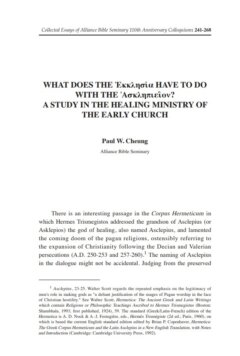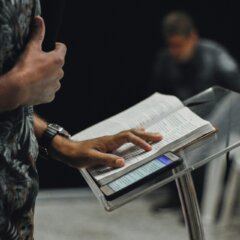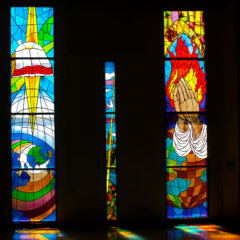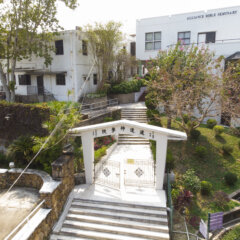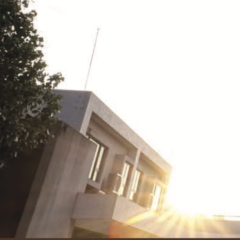WHAT DOES THE ’Ekklsia HAVE TO DO WITH THE ’Asklhpieion? A Study in the Healing Ministry of the Early Church/Paul W. Cheung
Paul W. Cheung
撮要
和福音書及使徒行傳不同,保羅書信裏除了哥林多前書十二章9、28、30節幾處經文外,並沒有提過醫治或醫治神蹟。從保羅對他自己和同工的疾病的態度看,我們也發現不出任何明顯的神蹟醫治服事的存在。這令哥林多前書的經文更顯特別。本文會從希羅和羅馬哥林多的醫治文化看,指出哥林多前書所提的醫病恩賜並非偶然,乃是和在哥林多的醫神宗教文化有關。在哥林多前書十二章裏所提到的偶像崇拜(十二2)、咒詛基督(十二3)、和肢體比喻(十二12-27),其實是保羅針對信徒生病時到醫神廟求醫的習慣,指出聖靈的工作,不光把哥林多信徒連成肢體,也能醫治個別信徒的身體。
ABSTRACT
A major departure of Pauline literature from the Gospel narratives and Acts is the lack of healing accounts, or accounts of healing miracles, aside from the mentioning of “gifts of healing” in 1 Corinthians 12:9, 28, 30. Paul’s attitude to his own physical ailments and the ailments of his coworkers does not reveal much regarding the existence or exercise of a healing ministry. This makes the references to such a ministry within a short span of text all the more interesting. The paper will survey the culture of illness and healing the Greco-Roman world in general and in Roman Corinth in particular. We will argue that the mentioning of “gifts of healing” in 1 Corinthians is not incidental but rather directly related to and in competition with the culture and practice of the healing cult of Asklepius at Corinth. The immediate verbal contexts of idol worship (12:2), cursing of Jesus (12:3) and the use of the body-parts metaphor (12:12-27) all point toward a situation where it is likely that Paul perceived the work of the Spirit as restorative to both the community body of Corinthian believers as a whole and the physical bodies of individual believers, thus displacing and eliminating the need of believers to visit the Asklepieion for cures.
原載於《教牧期刊》第27期及《建道學刊》第34期合刊(2010年7月),頁241-268。
作者簡介
張雲開
聖經系副教授
最新文章
「牧範」與「硬淨」! / 梁國強
2024 年 11 月 1 日
【代院長的話】神學教育的生命迴響 / 高銘謙
2024 年 10 月 1 日
【屬靈導引】屬靈導引—一門失落的藝術 / 董智敏
2024 年 10 月 1 日
编辑精选
從梧州到長洲:建道神學院125年的挑戰與恩典 / 陳智衡
2023 年 10 月 1 日
微小教會的見證/高銘謙
2023 年 6 月 1 日

